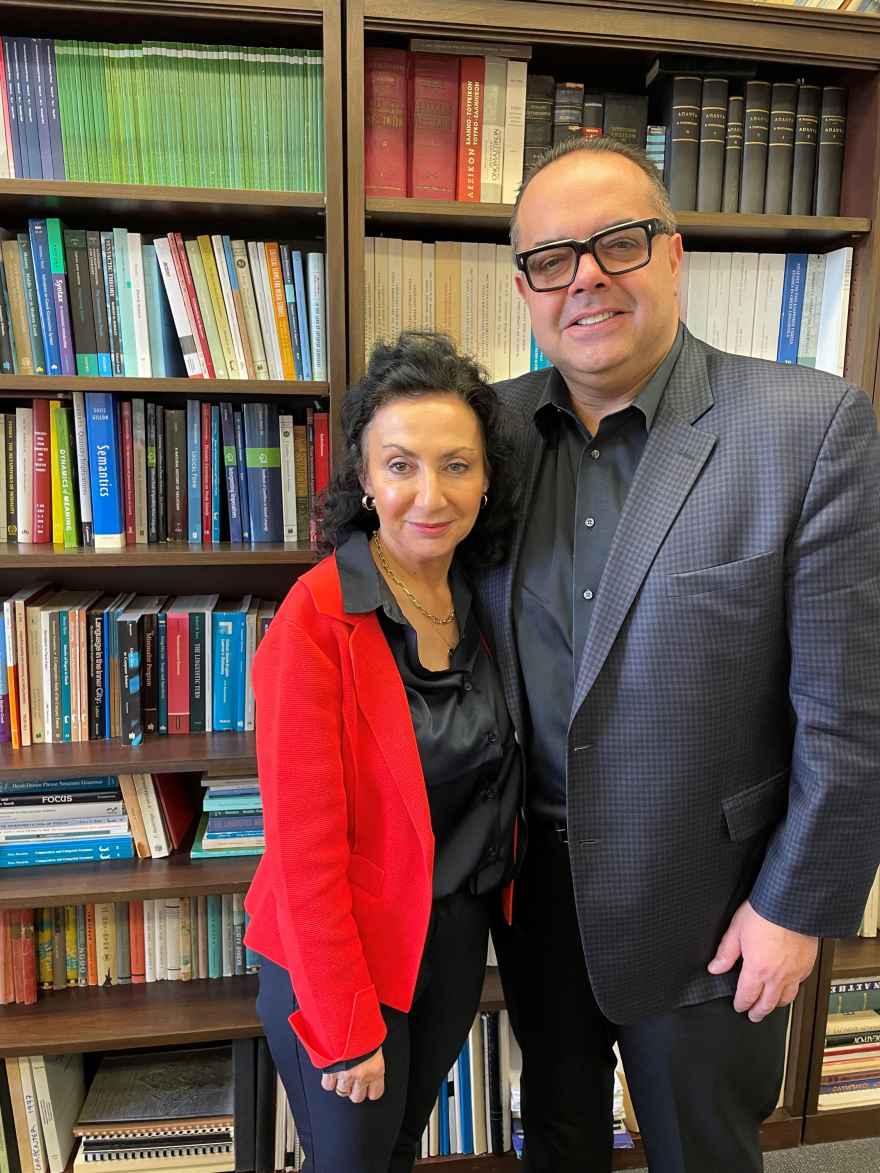Humanities Division Strengthens Its Commitment to Teaching the Modern Greek Language

By Sara Patterson
UChicago’s Division of the Humanities announces a $1.25 million gift for the study of the modern Greek language from the Alexander S. Pissios Family Foundation Fund for Teaching of the Greek Language. This generous gift from Alexander Pissios, UChicago College 2026 parent, will support the teaching of Greek through the Division of the Humanities and the Center for Hellenic Studies.
“What unifies the Greeks is their language, which presents a continuous unbroken tradition that stretches back in time for more than 3,000 years,” said Anastasia Giannakidou, founder and inaugural director of the Center for Hellenic Studies and the Frank J. McLoraine Professor in the Department of Linguistics at UChicago. “Modern Greek is a small language in the U.S., but an important element in the identity of the Greek diaspora and in need of revitalization.
“The Center for Hellenic Studies supports students and researchers studying the Greek canon within a unified perspective under one umbrella that puts together a diverse set of disciplines that address the ancient and the modern in language, literature, history, politics, culture, philosophy, and linguistics, providing a truly interdisciplinary forum.”
A businessman and philanthropist, Pissios desires to ensure that Hellenism remains a vital element in the global culture for many generations to come. Through his son who is in his sophomore year at UChicago, Pissios got to know a bit deeper the work Giannakidou is doing at the Center for Hellenic Studies. Her passion for the Greek language and culture inspired him. They share commonalities such as being the first- and second-generation immigrants to the U.S., their families’ roots in northern Greece, where they visit almost every summer, as well as the strong teaching credentials in their respective families. Both have a parent who was an educator.
Like his father, Pissios originally intended to become a teacher, enrolling at Northeastern Illinois University and serving as a special education teacher. He decided, however, to switch his career to business.
“I’ve been blessed financially in my life and want to pay it forward,” Pissios said. “This gift is intended to help Greeks and non-Greeks interested in modern Greek language and culture.”
Determined to maintain his connection to Greece, Pissios returns annually with his wife and four children to visit relatives still living in the northern section of the country. “It’s important for my children to see where they came from,” he said.
The Center for Hellenic Studies within the Division of the Humanities embraces research, pedagogy, and engagement with Hellenic civilization from ancient times to today. As an interdisciplinary center, it is committed to academic research and teaching in many fields while also building strong connections within the Hellenic community in Chicago and the Midwest.
“The Center for Hellenic Studies aims to sustain interest in the study of the Greek language and to support work on Greek ideas and areas broadly construed that can help in understanding our world today,” Giannakidou said. “The study of the great works of classical Greece is a vital part of a liberal education but is only the starting point of the broad study of Hellenic ideas across three millennia, resulting in the vibrant culture of the modern Greek space in the Eastern Mediterranean and around the world. We have great respect for the classics, but we also have a modern Greek perspective and define ourselves that way.”
Hellenic ideas, Giannakidou adds, are truly ecumenical, open to all people and cultures, as proposals for a good life and human flourishing. “We recently held an international conference on Phronesis—which is the Greek word for wisdom underlying practical and ethical agency—in collaboration with the French National Research Center,” she said. “It was a joy to see the multiple perspectives of fruitful engagement with the Greek ideas as we try to find solutions to contemporary problems. In that respect, it was a true UChicago event.”
More than just geographic area or a political entity, Greece serves as a diverse living space for inspiring culture and inquiry. At the same time, with the study of modern Greek, the Center focuses the lens, for the first time in UChicago history, on the Hellenic diaspora and emphasizes the often unknown and quite textured Greek identities that exist in the world today.
